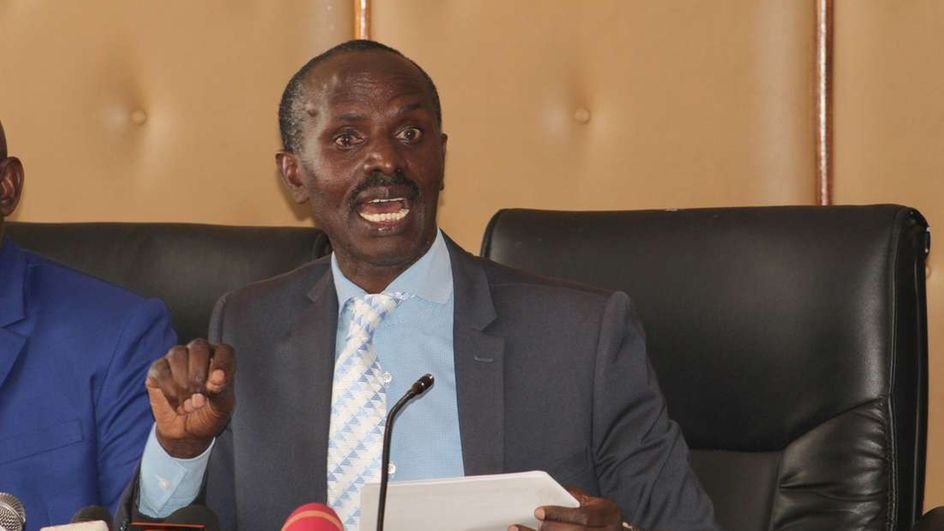In the last one week, the Kenya National Union of Teachers (Knut) Secretary-General Wilson Sossion has been threatening to call a teachers’ strike over transfers of heads of institutions and implementation of an appraisal system for teachers in public schools.
He has even attempted to link the few incidents of school unrest during the second term to the delocalisation of principals in secondary schools.
Yet, those familiar with the history of school strikes in Kenya and the documented research know that school strikes date back to the early 1970s, and it’s the reason the government has initiated numerous reforms in the management of learning institutions.
Back to delocalisation and the teacher appraisal programme.
SIGNED CBA
For obvious reasons, Mr Sossion has all along avoided informing teachers that the provisions on delocalisation and teacher appraisal are part of the 2017-2021 Collective Bargaining Agreement (CBA) signed between the Teachers Service Commission (TSC) and the two teachers unions — Knut and the Kenya Union of Post Primary Education Teachers (Kuppet) — which have a recognition agreement with TSC.
Specifically, the provisions on delocalisation and teacher appraisal are contained in clause 4 of the CBA and also in the Code of Regulations for Teachers (2015).
The contractual and binding nature of the entire CBA was affirmed when it was signed by unions’ representatives, who included Mr Sossion, and later registered at the Employment and Labour Relations Court (ELRC) in November 2017.
The importance and centrality of a CBA in governing the relationship between an employer and employees cannot be gainsaid.
STRIKES
A CBA provides the framework for engagement on financial and non-financial matters and, therefore, formalises the contractual obligations of the parties involved.
Primarily, a CBA exists to ensure industrial harmony by clarifying the different obligations of the parties involved within a given timeframe.
Until 2016 when the TSC signed the first ever CBAs with Knut and Kuppet, the teaching service was plagued by numerous strikes, which disrupted teaching and learning almost on annual basis.
After the signing of CBAs, industrial peace was restored and school programmes, including national examinations, ran according to schedule.
It is thus disturbing that lately Mr Sossion has persistently tried to invent a dispute where none exists.
As a matter of fact, there is no ambiguity whatsoever in the CBAs regarding provisions on delocalisation and appraisal.
DELOCALISATION
On the delocalisation of institutional administrators, the provision plainly states that: “In undertaking deployment, the commission shall endeavour to delocalise the administration of public educational institutions.”
Except for the term, there is nothing new to delocalisation.
Since the inception of TSC in 1967, the commission has always offered employment to teachers and posted them to work in any part of the country where their services may be required.
The essence is to ensure equity in provision of teaching services and quality instruction.
QUALITY TEACHING
By making provisions on teacher appraisal, which is now in its third year of implementation, TSC simply institutionalised an accountability system to enhance measurable quality teaching.
Fortunately, most teachers have embraced the appraisal system and on the overall a positive impact has already been registered.
To a very large extent, teacher absenteeism has been curbed as the system has an inbuilt mechanism to monitor school and class attendance.
Teachers now routinely prepare schemes of work and lesson plans, and in effect step into classrooms when they are better prepared to teach.
Long before the appraisal was negotiated and included in the CBA, teachers’ unions participated in the formulation and development of the teacher appraisal programme in 2014 and 2015, including a benchmarking trip to the United Kingdom in 2014 where Knut was represented by its chairman at the time, Mr Mudzo Nzili.
The unions, together with heads association representatives also took part in a pilot programme in six counties across the country.
PERILOUS JOURNEY
It is therefore dishonest and mischievous on the part of Mr Sossion to invent grievances on issues that had been agreed on and included in the CBA which he signed as Knut secretary-general.
Characteristically, any CBA has inbuilt mechanisms to address any emerging issues that may arise in the course of implementation.
The mechanisms do not include calls to strike.
More than anybody else, Mr Sossion knows teachers are not likely to heed to strike calls on matters that are clearly settled in the CBA.
They know it would be an unnecessarily perilous journey not worth travelling.
Mr Kamotho is head of Corporate Communications, Teachers Service Commission

